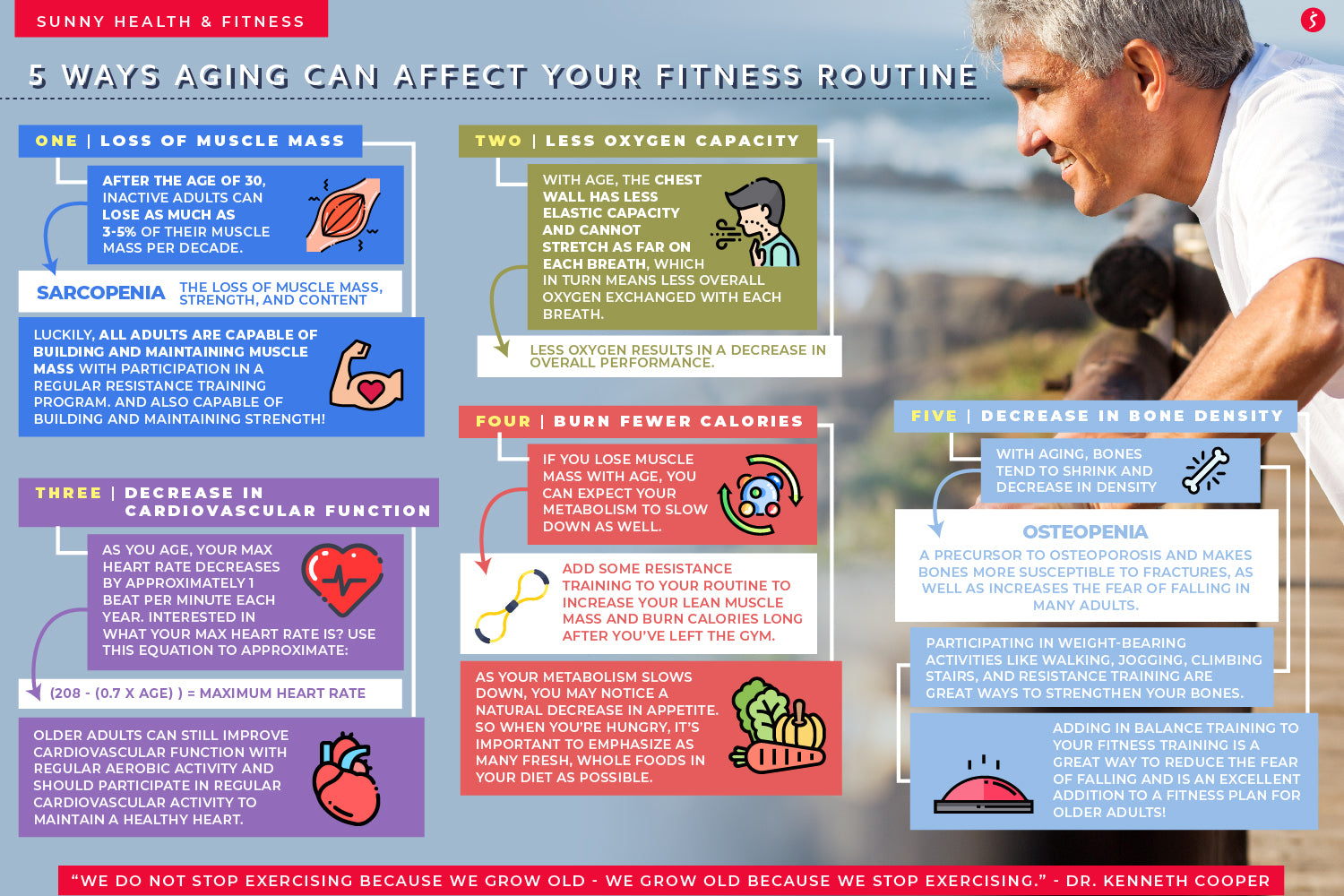Did you know active seniors have an expected increase in longevity and quality of life? In fact, being active is one of the most effective means of promoting a higher quality of life in older age. However, as you age, you can expect to experience many biological changes, and your fitness may begin to feel a little different because of these changes.
While you may experience change, it is safe and recommended for healthy older adults to participate in physical activity. Whether you’re old or young, learning about these changes in advance will help you make the easiest transition into this new stage of life, and protect your body by keeping it strong and healthy.
In this article, I’ll go through some of the physiological changes you may experience as you advance in age. While talking about declining body functions may not be a popular subject, it’s one that I think deserves more attention. With the proper information about physical changes you can expect, it will help you build a fitness routine that is balanced, realistic, and appropriate for you in every life stage.
1. Loss of Muscle Mass
After the age of 30, inactive adults can lose as much as 3-5% of their muscle mass per decade. This phenomenon is called sarcopenia – the loss of muscle mass, strength, and content. Luckily, all adults are capable of building and maintaining muscle mass with participation in a regular resistance training program. Just because older adults lose muscle quicker, it doesn’t mean that with regular resistance training they aren’t capable of building and maintaining strength.
2. Less Oxygen Capacity
With age, the chest wall has less elastic capacity and cannot stretch as far on each breath, which in turn means less overall oxygen exchanged with each breath. Less oxygen results in a decrease in overall performance. You may notice it’s difficult or you are unable to go as fast, long, or hard as you used to.
3. Decrease in Cardiovascular Function
As you age, your max heart rate decreases by approximately 1 beat per minute each year. Interested in what your max heart rate is? Use this equation to approximate:
(208 - (0.7 x age) ) = Maximum Heart Rate
What does this mean? Your heart will not be able to pump as much blood as fast as when you were younger, which will decrease your cardiovascular performance into older age. However, despite this, older adults can still improve cardiovascular function with regular aerobic activity and should participate in regular cardiovascular activity to maintain a healthy heart.
4. Burn Fewer Calories
Those with higher muscle mass have faster metabolisms; therefore, if you lose muscle mass with age, you can expect your metabolism to slow down as well. Luckily, if you’re interested in burning more calories, there are a few things you can do. For starters, add some resistance training to your routine to increase your lean muscle mass and burn calories long after you’ve left the gym.
As your metabolism slows down, you may begin to notice a natural decrease in your appetite. This is important because while consuming fewer calories, it’s easier to be lacking in many essential nutrients we need to thrive. That’s why, when you are hungry, it’s important to emphasize as many fresh, whole foods in your diet as possible.
5. Decrease in Bone Density
With aging, bones tend to shrink and decrease in density (also known as Osteopenia). Osteopenia is a precursor to Osteoporosis and makes bones more susceptible to fractures, as well as increases the fear of falling in many adults. This may cause you to fear exercising but this actually makes an exercise program even more important.
Participating in weight-bearing activities like walking, jogging, climbing stairs, and resistance training are great ways to strengthen your bones. Also, adding in balance training to your fitness training is a great way to reduce the fear of falling and is an excellent addition to a fitness plan for older adults!
This is not meant to be an exhaustive list of changes you may experience, but a list of many changes that the large majority will experience as we enter older age. I hope these glimpses into how your body works will help you be more mindful as you approach your fitness and nutrition, as well as influence some of the healthy decisions you make going forward.
“We do not stop exercising because we grow old - we grow old because we stop exercising.” - Dr. Kenneth Cooper



























Add Your Name & Email
Please enter your name and email to continue.We won’t display your email publicly.
1 comment
I think I finally get it. Since covid I stopped trying and now I am finally getting it. I KNOW that I need to do all that movement stuff, but to get it through my head was next to impossible. I finally got it. 😁